How To Get Out Of A Solar Panel Contract?
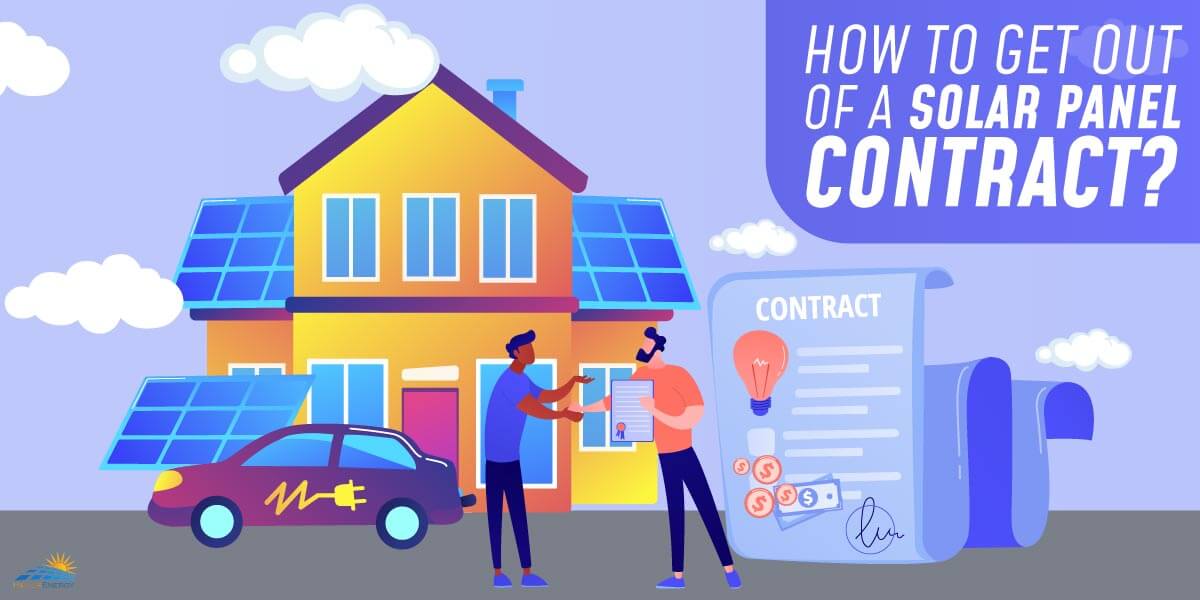
It is common to have your solar panels leased. Especially with all the commotion concerned with the purchase of a new house with leased solar panels, there are far too many details for you to get stuck on a single problem. However, after quite a point, you might start to wonder about your decisions when things die down.
Or, more frequently, after a few years down the lane, you might have questions popping up about your leased solar panels. And the market today comes with more options than ever, giving us the perfect way out if only we figure out how to get out of the solar panel lease contract.
What Is a Solar Panel Lease?
In a solar panel lease, you rent a solar system for your home for a predetermined amount of time; the system remains the property of the solar supplier throughout that time.
Essentially, during a solar lease, the owner will sign a solar lease agreement as the purchaser to specify the conditions of use. As a homeowner considering investing in solar, you should know both the benefits and drawbacks of a solar lease.
While, at first look, it may seem convenient, it is to be noted that while some people adapt well to solar leases, others do not. To determine the value of the lease, it is crucial to employ a solar lease calculator. Most purchasers are aware of the disadvantages of purchasing a solar system and eventually want to end solar leasing.
Types of Solar Leasing
1. Leasing
With a solar panel lease, a homeowner can use solar panels for 20–25 years without shelling out cash for an outright purchase. You pay the business for the solar panels’ energy benefits. The business is in charge of maintenance while getting tax and rebate breaks from the government.
2. PPA
Some businesses provide Power Purchase Agreements to homeowners (PPA). The homeowner purchases the electricity produced by the solar panels at a predetermined price per kilowatt-hour from the company after installing them on your roof. Similar to paying the utility provider, but with electricity produced at the house in question.
The homeowner enters into a PPA and agrees to pay a specific sum per kWh, with their payment fluctuating according to how much energy they use.
Therefore, the payment will be greater if the homeowner’s solar panels produce more energy in one month. The amount will be lower the following month if less power is consumed. Thus, “Power Purchase” was coined.
3. Renting
With its solar panels, Tesla has implemented a system of short-term rental contracts. Tesla will mount solar panels on your roof for a predetermined monthly cost. If solar isn’t for you, the business will remove them immediately. There isn’t a binding contract in place.
When renting, the homeowner pays a monthly lease payment for the solar panels rather than the up-front expenditures associated with purchasing them.
The firm leasing the panels will frequently also be in charge of maintenance, and solar panels will save the homeowner money on energy. However, the amount saved will vary depending on the house’s electricity usage, the price charged by the electricity provider, and the size of the solar energy system.
Reasons for Owners Removing Leased Solar Panels
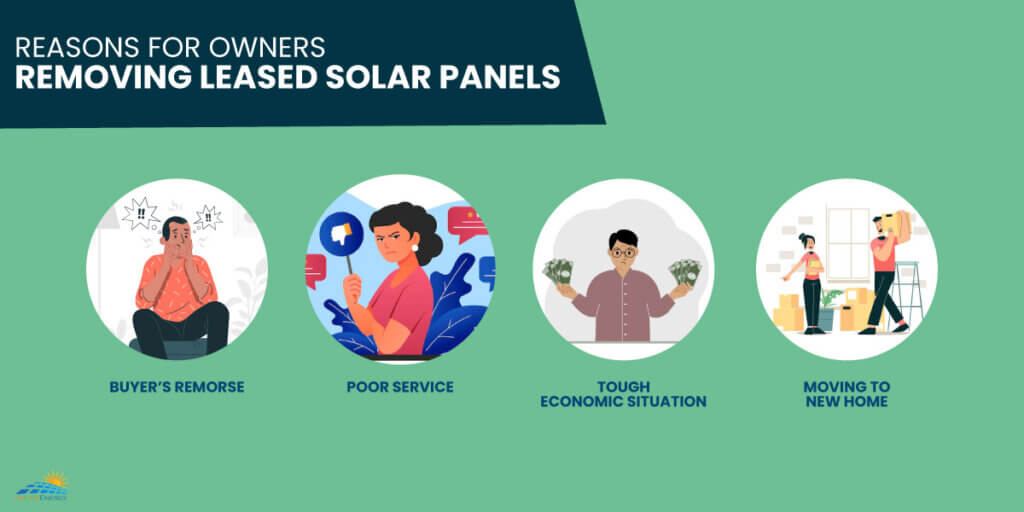
1. Buyer’s Remorse
This is a common and highly valid reason homeowners opt to remove their leased solar panels. Sometimes, the numbers fail to add up the same after a point. And at such a point, it is better to cut your losses short rather than continue with dissatisfaction.
Several new homeowners are often excited and subsequently overthrown by the excitement of moving into a new home. And the lure of solar panels being environmental-friendly and giving off a next-generation vibe often leads them to opt for the same.
The initial calculations also seem to yield highly affordable clean and green energy rates. However, it is important to remember that solar panels are not owned by the homeowners but rather by the leasing company. And the repair and maintenance soon render them at crossroads with breaking even.
While considering purchasing and installing solar panels, the homeowners vastly prefer the reduced numbers displayed by leasing them out. And the twenty-year contract seems long and secure.
However, later, it is observed that the shiny promises made were far less glittery up-close and the energy savings anticipated are far more than the actual ones. Which ultimately leads to the affordability becoming higher than if you had chosen to power it the traditional way.
And the final straw drops, and now you want to get out of your leasing agreement and wound up reading this article. But luckily for you, we’ve got the perfect solution to all your woes.
2. Poor Service
Poor service is another reason homeowners want out of their leasing agreement. Of course. It does not pay for a very expensive leasing agreement just to put up with poor quality service. That’s a scam.
The panels may not function properly because they were damaged during shipping or installation. Your lease company might not be eager to replace the damaged panels or perform the necessary repairs.
It’s possible that you were forced to use poor solar panels. Or perhaps the local environment proved unfavorable to the generation of sufficient solar energy to make your investment profitable.
For information on how to obtain satisfaction, speak with an attorney. If other clients of that leasing company have complained about the same issues, you might be eligible to break your contract early.
3. Tough Economic Situation
The perpetually increasing rates may not fall under your strength anymore. The rates might be too high, or the homeowners may be stuck in an unfortunate downward spiral. Economic situations of the unfavorable kind are the reason for several things in all of our lives.
And having an unnecessarily high power bill might not be helping matters one bit. Therefore, the best case scenario would be to cut your losses soon. And we have provided viable ways on how to get out of a solar panel contract or get out of a solar lease.
4. Moving to a New Home
You had to move because you acquired a new job somewhere else. You cannot take the solar panels with you because you are leasing them. You could also be able to. Ask your lease company to find out if you can transport the panels to your new home.
If not, find out if the landlord will permit the lease to be transferred to the new owner. Consult an attorney to understand how to terminate the lease if the new homeowner doesn’t want the panels and you can’t use them in your new property.
How To Get Out of a Solar Lease Contract
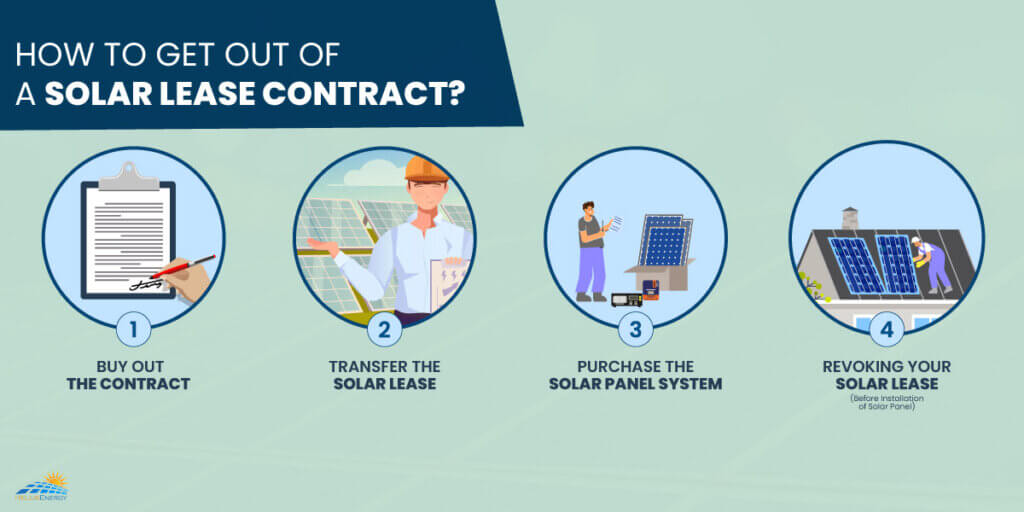
1. Buy Out The Contract
If your solar lease is about to expire in a few years, you might consider paying the remaining sum in advance and having the solar panels either left at the property or removed from it. Your solar company’s contract must have specified a buyout price and time frame.
But perhaps this isn’t always the case. A buyout is typically offered five to seven years into the lease. For more details, we advise you to read your lease agreement thoroughly.
It also results from the hiring procedure for the leasing company in the first place. Buyers frequently make blunders that lead them to choose untrustworthy service providers. It is best to be on the side of caution.
2. Transfer The Solar Lease
Transferring the contract to a new homeowner is another way to get out of a solar lease. To ensure that your lease is transferred to the new homeowners, certain solar firms, for instance, employ a Service Transfer Specialist who will assist you at every step.
Offer to transfer the solar panel lease to the next owners if you sell your home. Most businesses will have the personnel and infrastructure to speed up these transactions.
Many solar leases include an extra fee for the system’s removal and reinstallation. To install a solar system on a new rooftop, you will fundamentally need the approval of your homeowners’ association, utility company, or local government agency.
Reduce your home’s selling price by the amount of the transfer if the new owners reject your offer. Although some purchasers might not agree to this approach, you can always lower the house’s selling price by transferring money and still complete the deal.
3. Purchase The Solar Panel System
Some lease agreements mention the purchase price upfront but declare that a professional appraiser will determine the fair market value at the time of purchase. It would help if you analyzed the possibilities on the market today and how long your system has been in operation.
Remember that, unlike cars that depreciate over time, your solar panel system is bound to be a commodity for producing power; therefore, the purchase cost may be higher.
To ascertain the fair market worth of your solar panels, engage a qualified appraiser. This person will consider the solar panels’ age, condition, and the panel market at the time. Offer that pricing to the business.
4. Revoking Your Solar Lease (Before Installation of Solar Panel)
In any case, you should thoroughly consider all of your options before signing a solar lease. Only then will you be confidently equipped to decide on the best course of action for becoming solar. Depending on your circumstances, you might discover that renting, taking out a solar loan, or paying cash for the system is the best option for you.
Can You Cancel the Solar Panel Contract Before Installation?
Another loophole is if you’ve changed your mind after signing the contract before the solar panels were installed. Look over your contract. Many contracts feature 30-day grace periods that allow you to cancel the agreement without incurring fees. You are welcome.
Conclusion
It’s crucial to compare prices as much as you can. Often, all it takes is finding the proper business to partner with. You may be pleased with your service and won’t want to break your contract early if you have a reliable installer, outstanding solar panels, and excellent financing.
Finding out how to exit a solar lease is crucial in case something goes wrong and you decide to stop using solar energy. It will assist you in analyzing the solar lease contract and determining which choice is best for you. In contrast to the benefits, we find several solar lease downsides.
It would be best if you were given all your alternatives when choosing a solar supplier regarding whether to purchase solar or lease it. The objective is to purchase premium solar for yourself, which will be adequate for your energy needs and reduce your electricity costs.

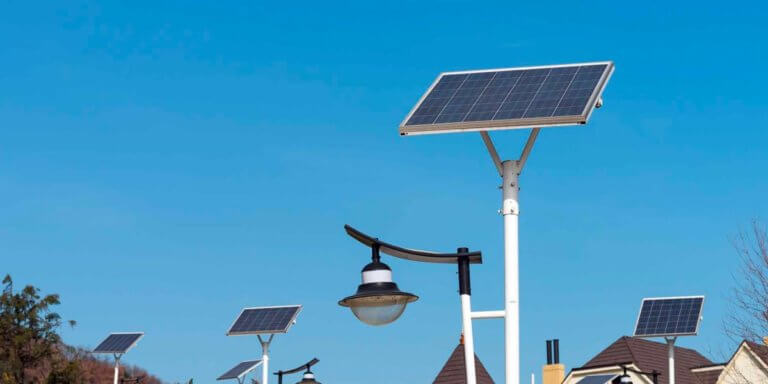
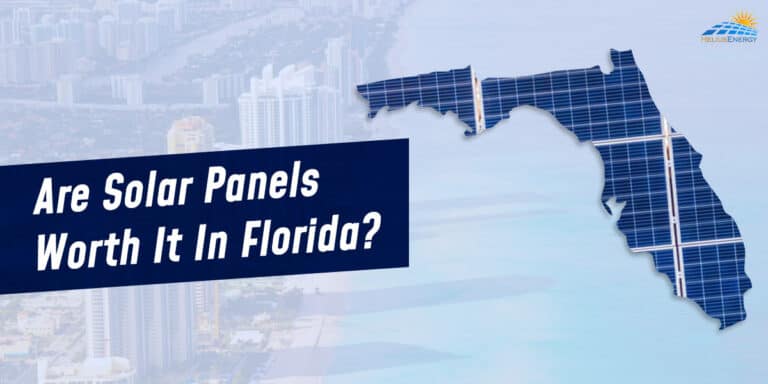
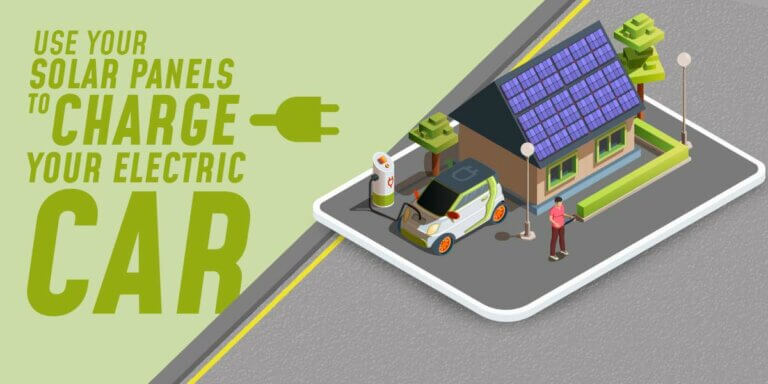
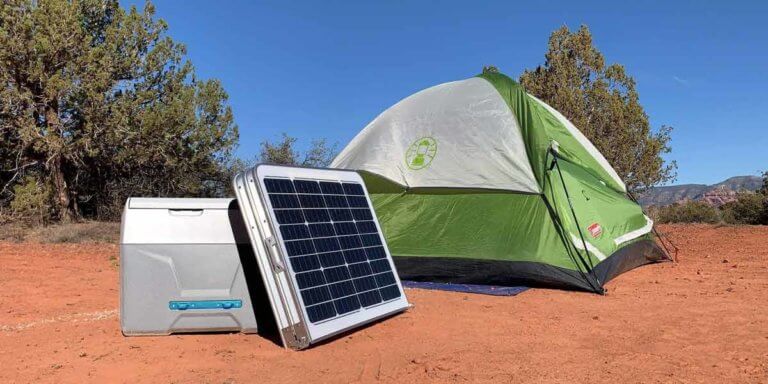
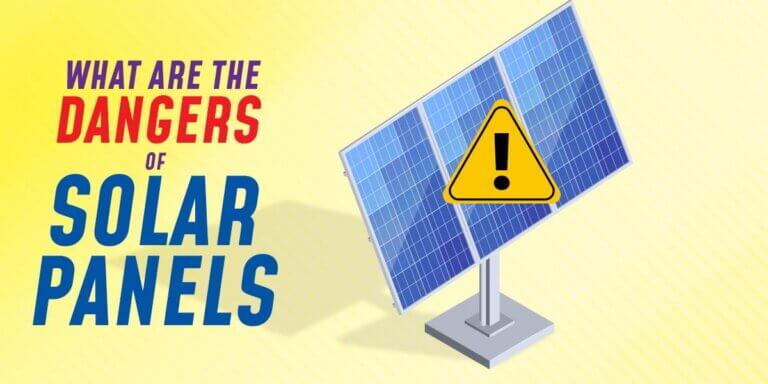
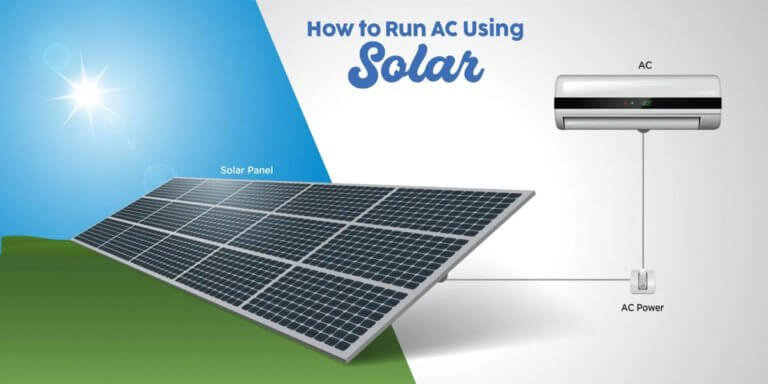
We signed a purchase contract for solar panels with a solar company ESP. The roof has been prepared (shingle tiles) for the installation as part of the contract already. Their customer service is terrible. The right hand does not know what the left is doing. Every time we speak to a customer service rep.we hear a different story. After 2 months after signing we still have no date when the panels will be installed. We were offered a different brand of solar panels of lesser kWh (395 instead of 440kWh) who they said they could install. We found out the ones we purchased, APTOS 440kWh are out of stock. Nobody seem to know when they come in (October they say?) if we are on the schedule to have the job done. We are very concerned that if the way ESP seem to not care about their customers this will not be any different after installation. Is there a way back and can we cancel the contract and how?
How can we get out of this contract?